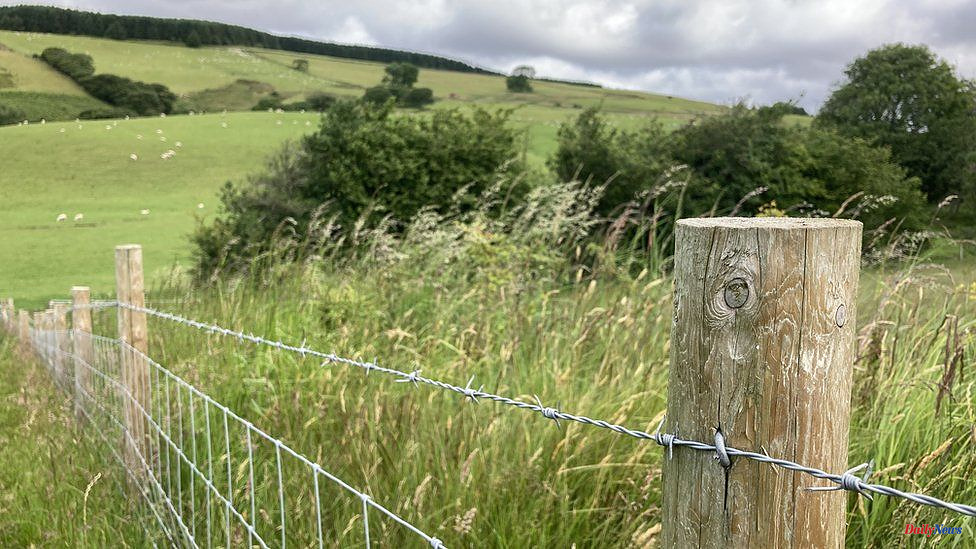It has been announced that farmers in Wales will need to plant at least 10% of their land in trees to be eligible for future public funding.
The new subsidy scheme also requires that you create ponds or manage wildlife habitats.
Ministers stated that farmers could make a fair and steady income while "drastically increasing" biodiversity.
The farm unions indicated that they would examine the proposals in order to determine if they were feasible.
Since the Brexit vote, a new Welsh subsidy scheme has been in development. It will replace EU-based agricultural payments and will be implemented starting in 2025.
The latest update is in the form a 70-page document by the Welsh government, which explains in greater detail how everything will work.
What can farmers do to make their land more productive?
To be eligible for the basic payment, farmers will need to perform a series of "universal actions".
They include reporting on pesticide use on their fields, and antibiotic use in their livestock.
They must have at least 10% tree cover and create, manage, and enhance semi-natural habitats on a further 10%.
They can count if they have an existing broadleaf forest, but any new trees will only be considered tree-cover.
For additional funding, they can add "optional actions to their subsidy contracts."
This funding would be used to fund more ambitious projects that are dependent on local conditions, such as funding to restore peat bogs and/or to use some fields for fruit and vegetable growing.
A pot of funding for "collaborative activities" would enable farms to collaborate on large-scale projects such as improving water quality in a river catchment or connecting areas of forest for wildlife.
The government would sign a five year contract with farms. They would monitor and report on their efforts, but could also be subject to random inspections.
What will they make?
Moreover, payment rates were not published today which is a significant problem for farmers. The Welsh government acknowledged that it was "disappointing".
Ministers stated that they are still waiting for economic analysis and modeling.
Once all details are available, the plan is to hold a final and third consultation next year.
As part of the cooperation agreement between Plaid Cymru & Welsh Labour, "stability payments" that are based on the old subsidy system will continue until the end 2029 transition period.
The EU funded had provided approximately PS337m per year in EU funding to Welsh farmers. Most of them rely on these payments for their survival.
BBC Wales' Rural Affairs Minister Lesley Griffiths said that the sector must be realistic and prepare for possible cuts amid ongoing disputes between the UK and Welsh governments over future budgets for agriculture.
What are the thoughts of farmers?
Russell Edwards, a sheep farmer high above Hendreforgan at the border of Rhondda Cynon Taf to Bridgend, said that subsidy payments were a "lifeline".
He said that "we wouldn't survive" without some form of subsidy, despite his efforts to diversify the business with a camping and wedding venue.
He said that the Welsh government's proposal "could have been very good", but he hadn't "seen any money yet - and that is the big question, will there still be enough to do these kinds of things?"
He stated that he believes he has all the necessary boxes to be eligible for the baseline payments, but that he doesn't want to plant any more trees.
He said that he used only a small amount of fertilizer this year because it was more expensive and that he needed every inch of ground to grow grass for his flock.
Dylan Morgan, NFU Cymru's head of policy, stated that publication of a set universal actions for farmers in exchange for an annual payment was a "big step forward" and "far more bureaucratic than previous proposals."
He said, "We need to look at these actions and see if we can make them practical and feasible on farms."
He said that there would be concern over the requirements for tree-cover and added that there would be many farms in Wales, either on the coast or uplands, who might struggle to meet those requirements.
Are the reforms enough?
Farmers take care of more than 80% of the Welsh landscape.
This is why the Welsh government regards them as crucial to its response to climate change and natural loss. However, it insists that it doesn't want to see widespread land-use change away from agriculture.
Alexander Phillips of WWF Cymru said that many farmers will be meeting certain requirements and "that was good because it shows that we're finally going after them for their positive actions".
"The problem is that some of it may be low-hanging fruit, which means it won’t deliver the necessary change... to address the climate and nature emergencies in this sector."
Ms Griffiths stated that she wants to "keep farmers in the land", so that they can grow food and help protect the environment.
She stated, "It's all about balance - the greatest threats to sustainable food production climate and natural emergencies."
"It's one agenda."












